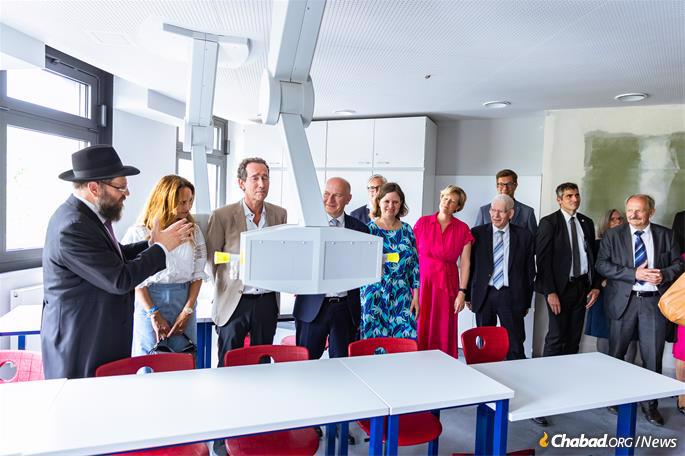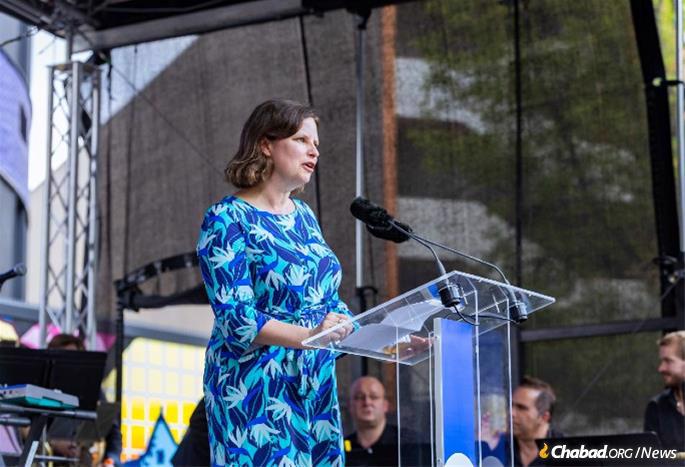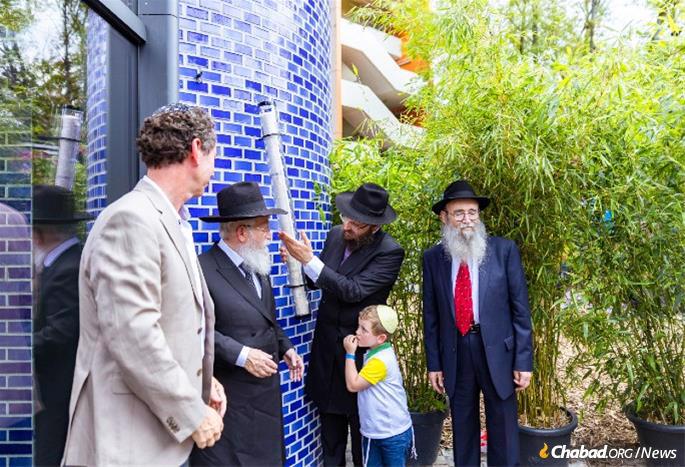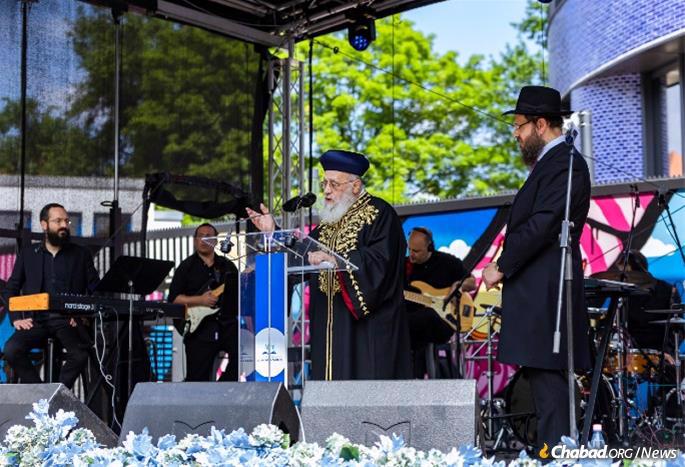Eighty years after the Holocaust, Israel’s chief rabbi, German officials and foreign dignitaries gathered on June 25 in Berlin at the opening of the Pears Jewish Campus, a sprawling $44 million, 90,000-square-foot Jewish educational, recreational and religious center, and the new home of Chabad-Lubavitch of Berlin. It is the largest Jewish structure built in Germany since World War II and one of the largest Jewish centers in the world.
The grand opening, hosted by Rabbi Yehudah and Leah Teichtal, Chabad-Lubavitch emissaries in Berlin since 1996, began with a street party, where the top brass of Germany’s political and business worlds spoke, offering their support for Berlin’s growing Jewish community and hailed the center as a symbol for the reemergence of Jewish life in Germany after the Holocaust.
“This is a special day for Berlin, a special day for Germany,” declared Governing Mayor of Berlin Kai Wegner, emphasizing the city’s obligation to continue to “support and secure” Jewish life in Germany. Dr. Josef Schuster, president of the Central Council of Jews in Germany, said the Chabad-Lubavitch campus was “not a place of isolation or hiding.” Instead, he said it was “a symbol for the future of Jewish life and families here.”
“This is a monumental step for Berlin Jewry,” said Teichtal, rabbi of the Jewish community of Berlin, whose work is supported by an additional 11 Chabad couples families in Berlin. “This is clearly the vision and blessing of the Rebbe [Rabbi Menachem M. Schneerson, of righteous memory],” who himself lived and studied in Berlin from 1928-1932.
“My great-grandfather, who perished in Auschwitz, would have never imagined a Jewish renaissance of this scale in the heart of Germany. We are honored to bring Judaism in Germany to the generation,” Teichtal told Chabad.org.
Resurgent Jewish Life in Berlin
Prior to the Holocaust, Berlin was home to the largest Jewish community in Germany. When the Nazis assumed power in 1933, the Jewish population in Berlin stood at around 160,500. By the end of World War II in 1945, the Jewish population had plunged to roughly 7,000.
Now, nearly eight decades later, Berlin has an estimated 30,000 to 50,000 Jewish residents. The present-day Jewish population not only includes descendants of the German Jews who survived the Holocaust, but also includes a significant number of Jews who migrated from the former Soviet Union following its collapse in the early 1990s. The city has also seen a surge of young Israelis and American Jews over the past 15 years, attracted by its business opportunities, casual atmosphere, and affordable cost-of-living. Over the last 16 months, there has been an additional influx of refugees from the war in Ukraine.
Since the Teichtals’ arrival in 1996, Chabad-Lubavitch institutions and programs have been established in the city to serve this diverse Jewish population. Some Chabad centers focus on expats from Israel, while others attract immigrants from the former Soviet Union. There is a special focus on Jewish students at the city’s universities, and childhood education is always a priority, with some Chabad schools in Berlin ranking among the city’s best. The lighting of a large Chanukah menorah at the Brandenberg Gate is an annual fixture that attracts thousands each year. Since the start of the war in Ukraine Chabad has hosted orphans and other refugees.
In addition to its service to the Jewish community, Chabad is seen as a role model to Germany as a whole.
”There are millions of Germans who don’t even know what Jews are,” said Teichtal at the dedication. “Let’s have positive cooperation, face to face, through dialogue, through shared, positive, joyful, lively, future-oriented Jewish life.”

Guests Celebrate an Impressive New Structure
In attendance at Sunday’s dedication was Israel’s Chief Sephardic Rabbi Yitzhak Yosef. From the federal government of Germany were deputy interior minister Juliane Seifert; deputy finance minister Florian Toncar; and vice president of the federal parliament Petra Pau. Representatives from the state government were finance minister Stefan Evers; governing mayor of Berlin Kai Wegner; culture minister Joe Chialo; education minister Katharina Günther-Wünsch; and president of the state parliament of Berlin, Cornelia Seibeld. Israeli ambassador Ron Prozor was also in attendance, as well as the president of the Council of Jews of Central Germany, Joseph Schuster.

Together they marveled at the center’s modern design, standing out with its dazzling glass and shimmering blue, which houses a daycare center, an elementary school, a high school and multiple fitness centers, as well as a co-working space, a cinema and a music studio. A 6,000-square-foot banquet hall, the largest of its kind in Berlin, is splashed with sunlight and connected to the center’s kosher kitchen, which provides cooking courses focusing on kosher cuisine.
An oasis in the center of the bustling German capital, the campus’ outdoor space includes several playgrounds, grassy areas, a sports field and a park.
Perhaps the most eye-catching and symbolic feature of all is the oversized mezuzah gracing the building’s front entrance, said to be the largest mezuzah in the world, surpassing Ben-Gurion airport’s famous mezuzah in size.







Join the Discussion